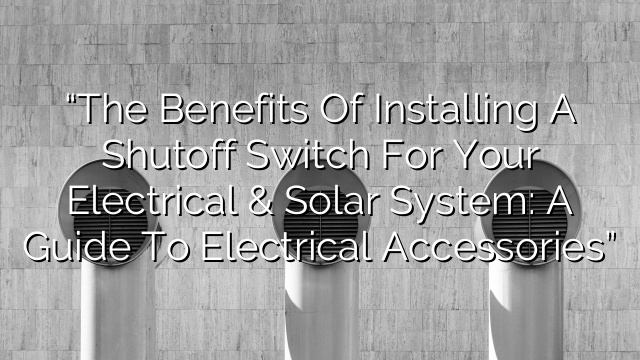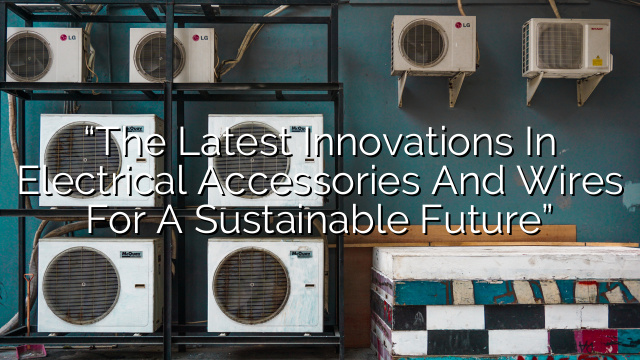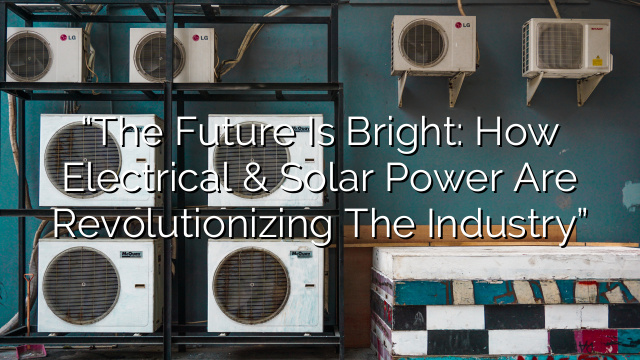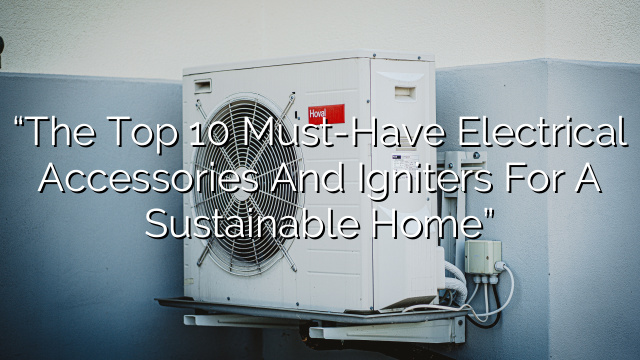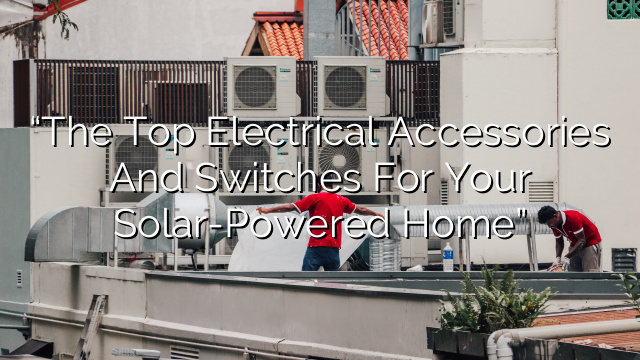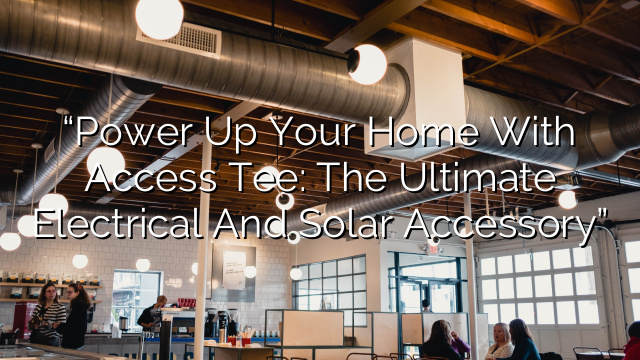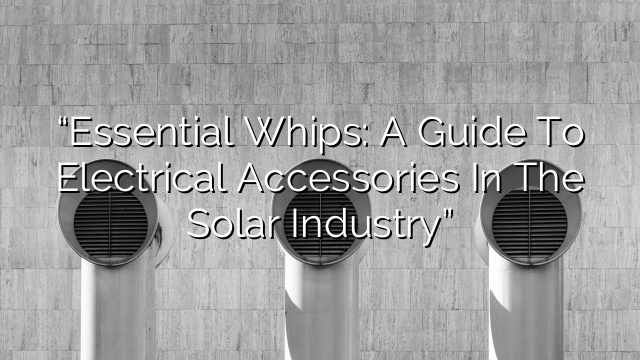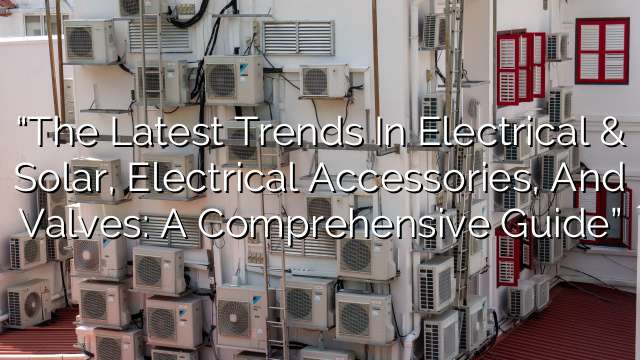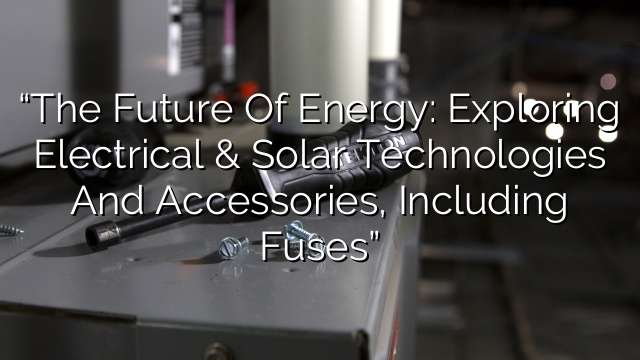The Benefits of Installing a Shutoff Switch for your Electrical & Solar System: A Guide to Electrical Accessories
- Introduction
- When it comes to your electrical and solar system, safety and efficiency should always be a top priority. One essential accessory that every homeowner should consider installing is a shutoff switch. This small but powerful device can provide numerous benefits to your system and ultimately to you, your family, and your property. In this guide, we will explore the advantages of installing a shutoff switch and how it can enhance the overall performance of your electrical and solar system.
- What is a Shutoff Switch?
- A shutoff switch, also known as a disconnect switch, is a device that allows you to manually disconnect the electrical or solar power supply to a specific circuit or the entire system. It is designed to quickly and easily shut off the power flow to prevent accidents, electrocutions, or fires. Depending on the type of system and the specific needs, there are various types of shutoff switches available in the market.
- Main Shutoff Switch: This type of switch is typically located near the main electrical panel or the main solar inverter. It disconnects the power supply to the entire system, offering complete protection during emergencies or maintenance.
- Branch Circuit Shutoff Switch: This switch is installed for specific circuits, allowing you to cut off power to individual areas of your electrical or solar system. It is particularly useful when you need to isolate a faulty circuit without disrupting the rest of your system.
- The Benefits of Installing a Shutoff Switch
- Now that we understand what a shutoff switch is, let’s explore the benefits of incorporating it into your electrical and solar system:
- Enhanced Safety
- Improved System Maintenance
- Prevention of Electrical Fires
- Energy Savings
- Easy System Upgrades or Repairs
- How to Install a Shutoff Switch
- Installing a shutoff switch for your electrical or solar system is not a complex task, but it should be done by a qualified electrician or a professional solar installer. Below are the general steps involved in the installation process:
- Determine the type of shutoff switch that matches your system requirements. This will depend on factors such as the size of your system, the number of circuits, and the location.
- Inspect your electrical panel or solar inverter to find a suitable location for the shutoff switch. It should be easily accessible and clearly visible.
- Turn off the power supply to the system from the main electrical panel.
- Connect the shutoff switch to the appropriate wires, following the manufacturer’s instructions and local electrical codes.
- Securely mount the shutoff switch in the chosen location.
- Test the shutoff switch to ensure it is functioning correctly. Turn off the power supply from the main electrical panel and then use the switch to turn off and on the power.
- Consult a professional to inspect and approve the installation.
- Frequently Asked Questions (FAQs)
- Here are some commonly asked questions about installing a shutoff switch for your electrical and solar system:
- Is it necessary to have a shutoff switch for my electrical or solar system?
- Can I install a shutoff switch myself?
- How much does a shutoff switch cost?
- Can a shutoff switch be used on both the electrical and solar system?
- Are there any maintenance requirements for a shutoff switch?
- Conclusion
- Installing a shutoff switch for your electrical and solar system is a wise investment that brings numerous benefits. It enhances safety, improves system maintenance, prevents electrical fires, saves energy, and simplifies system upgrades or repairs. Consult with a qualified professional to determine the appropriate type of shutoff switch for your system and ensure proper installation. By taking this simple step, you can enjoy a more efficient, safe, and reliable electrical and solar system for years to come.
One of the primary reasons to install a shutoff switch is to enhance the safety of your electrical and solar system. In case of an emergency or when maintenance work needs to be performed, a shutoff switch enables you to instantly cut off the power supply, reducing the risk of electrical shocks and accidents.
Regular maintenance is essential to keep your electrical and solar system working efficiently. With a shutoff switch, you can easily isolate specific circuits or the entire system, making it safer and easier for technicians to perform their tasks. It also prevents unintentional power surges or damages while working on your system.
Electrical fires can cause significant damage to your property and endanger lives. By installing a shutoff switch, you can quickly cut off the power supply in case of any electrical issues, preventing a small problem from escalating into a devastating fire. This added safety measure can give you peace of mind.
Another advantage of a shutoff switch is the ability to save energy. By disconnecting the power supply to specific circuits or the entire system when not in use, you can reduce energy wastage. This is especially beneficial for solar systems, allowing you to maximize your energy production and minimize your utility bills.
When upgrading or repairing your electrical or solar system, a shutoff switch makes the process much more convenient. It allows you to disconnect the power supply to the designated area, ensuring the safety of the technicians and the integrity of your system. This can speed up the installation or repair process and minimize downtime.
While not mandated by all building codes, having a shutoff switch is highly recommended for safety and convenience purposes. It provides peace of mind and allows you to easily control the power supply to your system.
While it is possible to install a shutoff switch yourself, it is always advisable to hire a qualified professional to ensure proper installation and compliance with local electrical codes. This will minimize the risk of mistakes and ensure the safety of your system.
The cost of a shutoff switch may vary depending on the type, brand, and your location. It is best to consult with a professional electrician or solar installer to get an accurate estimate for your specific needs.
Yes, a shutoff switch can be installed for both your electrical system and your solar system. However, it is important to select a switch that is compatible with the voltage and type of system you have.
Shutoff switches are relatively low-maintenance devices. It is recommended to periodically inspect the switch for any signs of damage or wear and tear. If you notice any issues, it is best to consult a professional for inspection and potential replacement.

